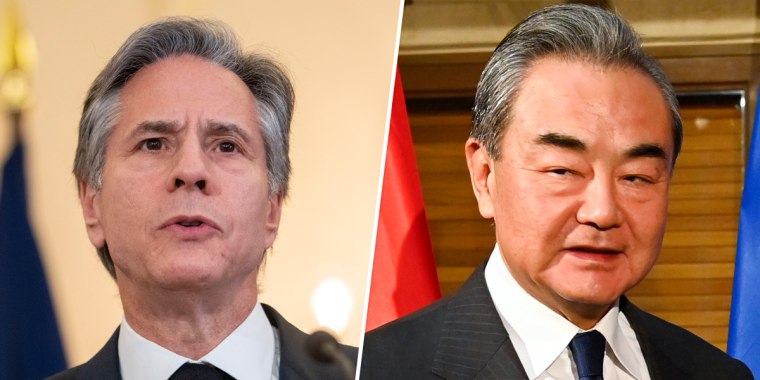Secretary of State Antony Blinken on Saturday met with a senior Chinese diplomat at a conference in Munich, the State Department said, as tensions between the two nations mount over the suspected Chinese balloon that the U.S. shot down this month.
Blinken and Wang Yi, director of the People's Republic of China CCP Central Foreign Affairs office, met on the sidelines of the Munich Security Conference, which both are attending, State Department spokesperson Ned Price said.
In a readout released after the meeting concluded, Price said the two diplomats discussed the balloon situation and Blinken told Wang that the balloon was an "unacceptable violation of U.S. sovereignty and international law."
The meeting lasted just over an hour, a senior State Department official said in a statement.
Blinken also told Wang that the U.S. "will not stand for any violation of our sovereignty, and that the PRC's high altitude surveillance balloon program — which has intruded into the air space of over 40 countries across 5 continents —has been exposed to the world," Price said.
The two officials also spoke about Russia's war in Ukraine, Price said, and Blinken warned Wang about the "implications and consequences if China provides material support to Russia or assistance with systemic sanctions evasion."
Diplomatic tensions between the U.S. and China have risen since the shooting down of the alleged Chinese spy balloon, which China has insisted was not intended for spying.
The U.S. has not heard any credible explanation and firmly stands by its assessment that it was a surveillance balloon, said the State Department official.
The U.S. and China exchanged strong words after the ballon was downed off the coast of South Carolina this month, with China’s Ministry of Foreign Affairs expressing in a statement its “strong dissatisfaction and protest over the use of force” by the U.S.
Secretary of Defense Lloyd Austin said afterward that the balloon was being used by the People's Republic of China "in an attempt to surveil strategic sites in the continental United States."
After China condemned the U.S. decision to shoot the balloon out of the sky, President Joe Biden said in an interview with NBC News Thursday that he plans to speak with his Chinese President Xi Jinping but did not say when, adding, “I think the last thing that Xi wants is to fundamentally rip the relationship with the United States and with me."
Earlier Thursday, Biden delivered his first remarks about the Chinese balloon and three unidentified objects flying above North America that were downed by the U.S. military. One was shot down Feb. 10 over Alaska, another was shot down Feb. 11 over Canada, and a third was shot down over Lake Huron on Feb. 12.
“I gave the order to take down these three objects due to hazards to civilian commercial air traffic and because we could not rule out the surveillance risk of sensitive facilities," he said in his remarks from the White House. “Make no mistake, if any object presents a threat to the safety and security of the American people, I will take it down."
Biden said that the U.S. still doesn't know what the three other objects over North America, which were also shot down by the military this week, were. But he suggested that the U.S. intelligence community believes they didn't have nefarious purposes.
“We’re not looking for a new Cold War, but I make no apologies,” Biden said. “I make no apologies, and we will compete and we will responsibly manage that competition so that it doesn’t veer into conflict.”
Blinken, according to Price, reiterated Biden's remarks during his Saturday meeting with Wang, saying that the U.S. will "unapologetically stand up for our values and interests, but that we do not want conflict with [China] and are not looking for a new Cold War."
He "underscored the importance of maintaining diplomatic dialogue and open lines of communication at all times," Price said. But Blinken and Wang did not reach a formal agreement on a hotline or formal mechanism to keep open lines of communication, according to the State Department official.
Earlier in the day, Wang had criticized the U.S. over the balloon incident, describing the U.S. shootdown of what he calls a civilian unmanned airship “hysterical and absurd” during his speech at the Munich Security Conference.
U.S. Northern Command said Friday it recommended an end to the search for debris from two objects shot down in United States airspace this month.
Earlier this month, Blinken postponed a trip to Beijing after the balloon was spotted over the U.S. “We have concluded that the conditions are not right at this moment for Secretary Blinken to travel to China,” a senior State Department official said.


